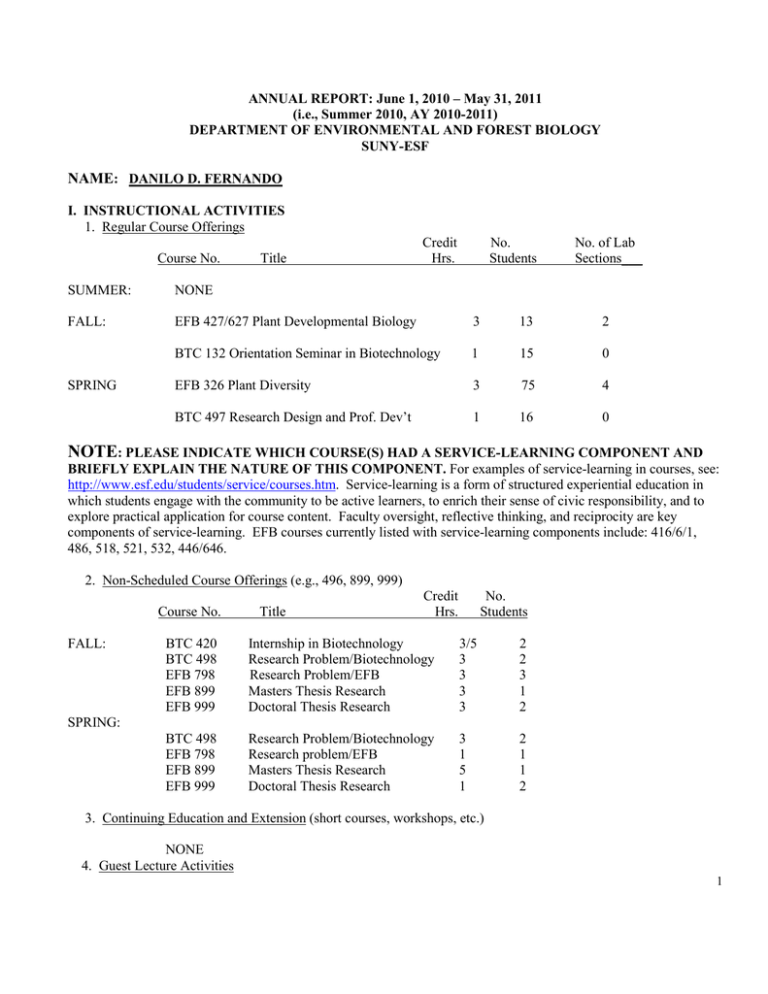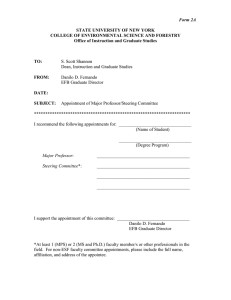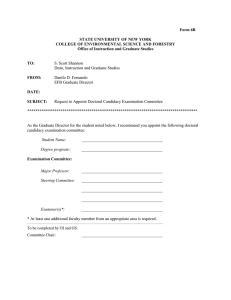ANNUAL REPORT: June 1, 2010 – May 31, 2011
advertisement

ANNUAL REPORT: June 1, 2010 – May 31, 2011 (i.e., Summer 2010, AY 2010-2011) DEPARTMENT OF ENVIRONMENTAL AND FOREST BIOLOGY SUNY-ESF NAME: DANILO D. FERNANDO I. INSTRUCTIONAL ACTIVITIES 1. Regular Course Offerings Course No. Title Credit Hrs. No. Students No. of Lab Sections___ SUMMER: NONE FALL: EFB 427/627 Plant Developmental Biology 3 13 2 BTC 132 Orientation Seminar in Biotechnology 1 15 0 EFB 326 Plant Diversity 3 75 4 BTC 497 Research Design and Prof. Dev’t 1 16 0 SPRING NOTE: PLEASE INDICATE WHICH COURSE(S) HAD A SERVICE-LEARNING COMPONENT AND BRIEFLY EXPLAIN THE NATURE OF THIS COMPONENT. For examples of service-learning in courses, see: http://www.esf.edu/students/service/courses.htm. Service-learning is a form of structured experiential education in which students engage with the community to be active learners, to enrich their sense of civic responsibility, and to explore practical application for course content. Faculty oversight, reflective thinking, and reciprocity are key components of service-learning. EFB courses currently listed with service-learning components include: 416/6/1, 486, 518, 521, 532, 446/646. 2. Non-Scheduled Course Offerings (e.g., 496, 899, 999) Course No. FALL: Title Credit Hrs. No. Students BTC 420 BTC 498 EFB 798 EFB 899 EFB 999 Internship in Biotechnology Research Problem/Biotechnology Research Problem/EFB Masters Thesis Research Doctoral Thesis Research 3/5 3 3 3 3 2 2 3 1 2 BTC 498 EFB 798 EFB 899 EFB 999 Research Problem/Biotechnology Research problem/EFB Masters Thesis Research Doctoral Thesis Research 3 1 5 1 2 1 1 2 SPRING: 3. Continuing Education and Extension (short courses, workshops, etc.) NONE 4. Guest Lecture Activities 1 Course No. Title No. of Lectures EFB 535: Flowering Plants: Diversity, Evolution, and Systematics 2 II. STUDENT ADVISING A. Number of undergraduates for whom you are the student’s official advisor __14__ and unofficial advisor _20_ B. Graduate Students: (Name, degree sought, starting date, month & year; if a degree was completed, please give date and full citation for the thesis or dissertation). MAJOR PROFESSOR Christina R. Quinn, Ph.D. Program, Started August 2006 Arnold M. Salazar, Ph.D. Program, Started January 2007 Jeremy Discenza, MS Program, Started August 2010 CO-MAJOR PROFESSOR NONE MEMBER, STEERING COMMITTEE (other than those listed above) Collin Fischer, Ph.D. Program, Started August 2005 – Chemistry Department (SB3 Program), SU Nikhilesh Dhar, Ph.D. Program, Started August 2006 – Biology Department, SU CHAIRMAN OR READER ON THESIS EXAMS, ETC. Bryne Riley, BLA – Chair of thesis defense III. RESEARCH COMPLETED OR UNDERWAY A. Departmental Research (unsupported, boot-legged; title - % time spent) Cloning and bioinformatic analysis of secreted proteins from pine pollen tubes (15%) Cloning and bioinformatic analysis of microRNAs from pine pollen tubes (15%) Development of a pollen derived cell line from Ginkgo (15%) B. 1. Grant-supported Research (source, subject, amount - total award and current year, award period starting and ending dates; list graduate research assistants supported by each grant) Confronting the obstacles to willow genetic transformation (Tim Volk, co-PI). USDA-McIntire-Stennis, $50,591. May 15, 2010 - Sep 12, 2011. Graduate Research Assistant – Arnold Salazar (Ph.D. student) Genetic diversity of American hart’s-tongue fern in Clark Reservation, The Nature Conservancy, $8000 (Don Leopold, co-PI). June 15-December 21, 2010. Summer Graduate Student Assisdtant – Christina Quinn (Ph.D. student). 2. Research Proposals pending (include information as in B.1., above). 2 - Evaluating environmental impacts of maturing transgenic American chestnut trees relative to chestnut trees produced by conventional breeding. PI: WA Powell, Co-PIs: CA Maynard, DJ Leopold, DD Fernando, D Parry, CA Nowak, RD Briggs. USDA BRAG. - Enhancing Salt Stress Tolerance of Short Rotation Woody Crops For Biofuels Production. Northeast Sun Grant ($150,000, PI: Steve Difazio, West Virginia, co-PI DD Fernando, SUNY-ESF). - Production of genetically diverse American hart’s-tongue fern for introduction or reintroduction in the great lakes region. USDA-USFWS, $99,600. PI: DD Fernando, Co-PI: DJ Leopold. - Genetic diversity, morphometrics and habitat analysis of a rare fern in Northern Forests: Implications for management and long-term survival. USDA Forest Service NSRC, $82,876. PI:DD Fernando, Co-PIs: DJ Leopold and SW Bailey. 3. Research Proposals submitted, but rejected (include information as in B.1, above) - Confronting the obstacles to willow genetic transformation: Agrobacterium transformation (PI: DD Fernando, Co-PI: Tim Volk). USDA-McIntire-Stennis, $25,000. - Increased wood production in willow through enhanced vascular cambium activity. SUNY-ESF Seed Grant. $8,000. PI: DD Fernando. - NEWBio: The Northeast Woody Biomass Consortium. USDA NIFA, $45 million, PI: Tom Richard (Penn State), and 60 other investigators across the Northeast US. IV. PUBLICATIONS (Full bibliographic citation, i.e., do not use "with Jones," or "Jones, et al."; please list only publications published, in press, or actually submitted during this reporting period --- do not list manuscripts in preparation). A. Refereed Publications None but at least five manuscripts are currently in preparation. B. Non-refereed Publications None C. Papers Presented at Science Meetings (give title, date, occasion, and location) CR Quinn and DD Fernando. Approaches to microRNA Profiling of Germinated Loblolly Pine Pollen. PLANT BIOLOGY 2010 - Joint Annual Meeting of the American Society of Plant Biologists & the Canadian Society of Plant Physiologists. July 31- August 4, 2010, Montreal, Canada. Poster Presentation. AM Salazar and DD Fernando. Secretory Proteins from Germinated Loblolly Pine (Pinus taeda) Pollen. PLANT BIOLOGY 2010 - Joint Annual Meeting of the American Society of Plant Biologists & the Canadian Society of Plant Physiologists. July 31 - August 4, 2010, Montreal, Canada. Poster Presentation. CR Quinn and DD Fernando. Roles of Novel and Differentially Expressed microRNAs in Loblolly Pine Pollen Germination. Plant and Animal Genome XIX Meeting, San Diego, January 15-19, 2011. Invited Talk. CR Quinn and DD Fernando. Mechanisms of Pollen Germination: Identification and Characterization of Novel and Differentially Expressed microRNAs. Plant and Animal Genome XIX Meeting, San Diego, 3 January 15-19, 2011. Poster Presentation. J Discenza, CR Quinn, K Jaenecke and DD Fernando. Genetic variance analysis of Asplenium scolopendrium (var. americanum ) in Clark Reservation using ISSR-PCR. SUNY-ESF’s Spotlight on Student Research. April; 12, 2011. K Jaenecke, J Discenza and DD Fernando. Restoration of a federally threatened fern through production of genetically diverse individuals by means of DNA marker assisted in vitro fertilization. SUNY-ESF’s Spotlight on Student Research. April; 12, 2011. CR Quinn and DD Fernando. Conservation and Divergence of Novel and Differentially Expressed microRNAs in Loblolly Pine (Pinus taeda) Pollen. 18th Plant Biology Symposium: Plant Evolutionary Genetics and Genomics. May 18-21, 2011, Pennsylvania State University. Poster Presentation. AM Salazar and DD Fernando. Profiling and Evolution of Secretory Proteins involved in Loblolly Pine (Pinus taeda) Pollen Germination. 18th Plant Biology Symposium: Plant Evolutionary Genetics and Genomics. May 18-21, 2011, Pennsylvania State University. Poster Presentation. D. Public Service Presentations (lectures, seminars, etc. to and for the public; give group or occasion, date(s), and attendance) NONE V. PUBLIC SERVICE A. Funded Service (include consulting activities) 1. Government Agencies (Federal, State, Local): NONE 2. Industrial and Commercial Groups, etc. NONE B. Unfunded Service to Governmental Agencies, Public Interest Groups, etc. None VI. PROFESSIONAL DEVELOPMENT A. Professional Honors and Awards (for teaching, research, outreach, etc.) B. 1. Activities in Professional Organizations (offices held, service as chairman, member, participant or consultant) 2. Professional Society Membership 4 3. Other Professional Activities a. Editorial activity Journal (s) Responsibility International Journal of Plant Developmental Biology (IJPDB) Member, Editorial Board Other (books, symposia, etc.) b. Reviewer Journal(s) No. of manuscripts Canadian Journal of Plant Science Grana International Journal of Plant Sciences Plant Cell Reports Proteomics Scientia Horticulturae Tree Genome and Genomics 1 1 1 2 1 1 1 Agency No. of proposals USDA NIFA 5 Consortium of Plant Biotech Research, Inc. 2 Other c. Participation (workshops, symposia, etc.) Name of workshop, etc. Date Place C. Further Education/Re-training Undertaken, Leaves, Workshops, etc. iPlant Faculty Workshop at Howard University, Washington, D.C. June 11-12, 2010. This workshop is to train faculty by providing cyberinfrastructure support on large-scale genomic analysis for innovative curricula and engaging student research projects. D. Foreign Travel (Where, When, Purpose) VII. ADMINISTRATIVE AND SERVICE RESPONSIBILITIES (include committee participation) A. Department-level Director, EFB Graduate Program 5 Member, Graduate Program Advisory Committee Coordinator, Committee on Optical Instruments and Equipment B. College-level Member, Graduate Council C. University-wide, including Research Foundation NONE VIII. SUMMARY OF SIGNIFICANT ACTIVITIES AND ACCOMPLISHMENTS DURING THIS REPORTING PERIOD, ESPECIALLY THOSE MOST NOTEWORTHY AND RELATIVE TO THE COLLEGE’S AND DEPARTMENT’S MISSION. One paragraph on each of the following would be most helpful: this past year, what have you done for our students, department/college, and self professionally? NOTE: The information in this section (along with the supporting specific information elsewhere in this report) should be your strongest case for being considered for a discretionary raise, which I’ll continue to award based on your contributions to the department and college this reporting period. For the Students: This past academic year, I taught Plant Developmental Biology and Plant Diversity, convened the freshman orientation seminar for biotechnology majors, took over the course BTC 497 (Research Design and Professional development), trained several undergraduate students in my lab through independent research and internship, presented invited lectures to other courses, and worked with my three graduate students (1 M.S. and 2 Ph.D.) on various aspects of their research projects, grant/fellowship applications, and poster presentations. In total, at least 135 students have been served under various capacities. Kelly Jaenecke, an undergrad that I trained in the lab and encouraged to write a proposal as part of her independent research, received funding from the Rochester Academy of Sciences to pursue her research on in vitro production of genetically diverse American-hart’s tongue fern through in vitro fertilization. I also have corresponded, interviewed and accepted three new graduate students who will begin their M.S. program this coming fall semester. For the department/college: I served as the Director of our graduate program (for the fourth year) and my major activities included the following: 1) replied to all inquiries about our graduate program (through email, phone, and/or personal visits) on an almost daily basis from several potential applicants and current graduate students, 2) processed a total of 158 applications (23 for spring and 135 for fall) that involved reviewing each application for initial assessment and to designate faculty reviewers, following up on the completion of the reviews on each application, summarizing the reviews for each application, and submitting EFB’s recommendation for each accepted and rejected applications to the Dean of Instructions and Graduate Studies, 3) provided orientation seminars to new graduate students about our graduate program and the new faculty about the graduate application process, 4) served as the department’s representative to the Graduate Council and raised issues regarding problems/suggestions on how to improve the graduate program; I have also shared the ideas and activities of the Graduate School to the department’s graduate committee and faculty, and 5) worked with the Graduate Secretary on the update and improvement of the various facets of the EFB’s Graduate Webpage, graduate application excel file system, and continued the survey on the most effective means of attracting/recruiting graduate students. For professional accomplishments: The following are what I consider as significant: 1) I was invited to serve as a panel member to review and deliberate on the proposals submitted to USDA/NIFA on Bioenergy Coordinated Agricultural Project, 2) Publication of the Special Issue on “Plant Development and Evolution” where I served as the Guest Editor, 3) Approval by Cambridge University Press to write a textbook on “Sexual Reproduction in Forest Trees” with Dr. John Owens as co-author. This is an 18-month project that officially started in January 1, 2011, 4) Wrote and submitted seven grant proposals - four as a PI and three as co-PI, and 5) Participation in the iPlant 6 workshop where I learned how to analyze large-scale nucleic acid sequence data using various bioinformatics tools to investigate and annotate genomes, assemble gene models, associate phylogenetic trees, and analyze DNA barcodes. IX. A. FUTURE PLANS, AMBITIONS, AND POTENTIAL CONTRIBUTIONS FOR YOUR OWN PROFESSIONAL DEVELOPMENT AND THE ENHANCEMENT OF THE PROGRAM IN ENVIRONMENTAL AND FOREST BIOLOGY (brief summary). For the next academic year, the bulk of my time will be spent in the following activities: 1) teaching, 2) research, 3) graduate admissions, and 4) textbook writing. B. PROJECTED ACTIVITIES FOR NEXT YEAR 1. Summer 2011 a. Course(s) to be offered b. Proposed research activity: In vitro regeneration of willow, Genetic diversity of American hartstongue fern, Mechanism of pine pollen germination - roles of microRNAs and secretory proteins, grant proposal preparation, and textbook writing. c. University, professional society, and public service 2. Fall Semester 2011 a. Course(s) to be offered EFB 427/627: Plant Developmental Biology Diversity of Life 1: Will cover 2 lectures and 1 lab on Lycophytes, Pteridophytes and Gymnosperms. b. Proposed research activity In vitro regeneration of willow, Genetic diversity of American harts-tongue fern, Mechanism of pine pollen germination - roles of microRNAs and secretory proteins, grant proposal preparation, and textbook writing. c. University, Professional society, and public service Review of graduate applications, participate in the activities of GPAC and Graduate Council. 3. Spring Semester 2010 a. Course(s) to be offered EFB 326: Plant Diversity BTC 497: Research Design and Professional Development b. Proposed research activity In vitro regeneration of willow, Genetic diversity of American harts-tongue fern, Mechanism of pine pollen germination - roles of microRNAs and secretory proteins, grant proposal preparation, and textbook writing. c. University, professional society, and public service Review of graduate applications and participate in the activities of GPAC and Graduate Council. 7


